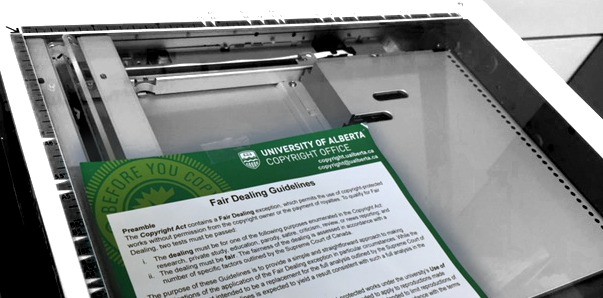
The statutory review of the Copyright Act is now underway. The outcome of this review could have a significant impact on post-secondary institutions, so it is important to ensure that a broad range of voices from this sector make their views heard during the consultations.
The Canadian Parliamentary Standing Committee on Industry, Science and Technology (INDU), which is leading the review process, held its first public meeting for the review on April 17th. This meeting included witnesses from four post-secondary stakeholders: Universities Canada, the Canadian Federation of Students (CFS), the Canadian Association of University Teachers (CAUT), and Campus Stores Canada. The second meeting was held on April 24th and included the Canadian Association of Research Libraries (CARL), the Canadian Alliance of Student Associations (CASA), as well as the Union des écrivaines et des écrivains québécois (UNEQ) and the Canadian Research Knowledge Network (CRKN). The third meeting is scheduled for April 26th and will include Colleges and Institutes Canada, as well as the Association of Canadian Publishers and the Writers’ Union of Canada. Committee information regarding the review, including news releases, information on upcoming meetings, and audio or video of past public meetings, is available here.
How This Review Will Be Conducted
The review is structured in three phases. In Phase I, the Committee will hear testimony from witnesses representing specific sectors, including education and publishing. In Phase II, the Committee will hear testimony from witnesses representing a broad range of stakeholders, such as Indigenous communities and other interest groups. Finally, in Phase III, the Committee will hear testimony from legal experts and professional associations.
In addition, the Committee is scheduled to make stops in five Canadian cities; Halifax, Montreal, Toronto, Winnipeg and Vancouver, during the week of May 7th, holding hearings and open mic sessions. More information on this is available in the news release of 25 April 2018.
Throughout the process, the Committee will be receiving written briefs (of up to 2,000 words) from all interested parties. The Committee is aiming to have completed all three phases of the review by early 2019.
Why This Review Process Is Important
Copyright is a creature of statute that was introduced in the 18th century to serve the public interest, which has been and continues to be to promote the creation of new works that can be used productively by the broader public. This interest is served by balancing the right of creators to be appropriately compensated for their works with the right of users to access and benefit from those works.
While balancing these rights is the overall goal, stakeholders on each side of the equation continue to push to strengthen or enhance the rights on their respective side. The task of the Committee is to consider the arguments from the various stakeholders and to make revisions to the Act that will better ensure the preservation of a proper balance. For that reason, it is important that stakeholders take steps to ensure that their arguments are heard and considered by the Committee.
What Is At Stake for the Post-secondary Sector
This review is not only an opportunity for members of the post-secondary sector to push for new provisions in the Copyright Act that will better serve the public interest, but also to strongly defend some of the provisions that have been gained in the past and that are under threat. Here are some of the key issues that are likely to be prominent in this review.
a) Fair Dealing. “Education” was added as a purpose for fair dealing under s.29 of the Copyright Act as one of the amendments to the Act that came into force in 2012. Access Copyright, along with a segment of the publishing industry, has seen a reduction in revenues over the last five years, and they are blaming the use of fair dealing for that reduction. This group is conducting a lobbying campaign against fair dealing, particularly for the purpose of education. For more details about how fair dealing works at universities, see my earlier blog post.
b) Copyright Term. The term of copyright has always been limited. Given that the rationale for copyright law is to encourage new creative works, the length of the term of copyright protection should be limited to what would provide a reasonable incentive to encourage that creation, ensuring that the creator is able to benefit commercially from his/her works for that period. The current term of copyright protection in Canada for literary and artistic works is the life of the author plus 50 years. However, in a number of countries, including the United States and the European Union member states, copyright term is life plus 70 years. This has put Canada under some pressure, particularly in relation to international trade agreements, to extend its copyright term to life plus 70. However, looking at copyright as a balance of rights to serve the public interest, it is not clear how such an extension would provide creators with any additional incentive. Furthermore, such an extension would have a significant adverse impact on the growth of the public domain in Canada, which is an important and valuable resource for researchers, educators, and the Canadian public.
c) Technological Protection Measures. While content creators and providers have legitimate concerns about preventing piracy of their works, the use of digital locks can also impede lawful uses of the works those locks are protecting. Moreover, the current Copyright Act makes it unlawful to circumvent such a digital lock, even where that circumvention is for a lawful purpose, including for educational purposes.
d) Crown Copyright. When the government invests public money in a report that is then made public and freely available online, it seems antithetical to the public interest that the government might later restrict access to or the use of that report under copyright law. However, researchers continue to run up against just that as a result of the current status of Crown copyright.
e) How copyright relates to Indigenous knowledge. Copyright statutes have tended to focus on the “fixation” of works, where the first person to write or record a new creative work generally becomes the owner of the copyright in that work. This is based on a model that expects the author/creator to be the one who is writing or recording the work. However, this model does not fit well with works arising from an oral tradition, where those works are the shared assets of a community rather than the property of any one individual.
Get Involved
The Committee invites Canadians to submit written briefs not exceeding 2,000 words. Briefs may be emailed to: indu@parl.gc.ca. Some general information about how to prepare a submission can be found in the Guide for Submitting Briefs to House of Commons Committees.
Although it is very important that organizations like Universities Canada, CAUT and CFS are getting involved in the copyright review process, it is equally important that other post-secondary stakeholders, including individual faculty members and students, do not sit back and assume that the situation is well in hand. If you have a story to tell about how copyright impacts your research or teaching, now is the time to tell that story. It is not reasonable to expect a few 2000-word briefs from prominent organizations to provide a full account of the importance of these copyright issues across the post-secondary sector, nor of the potential adverse impacts if those issues are not properly addressed in the review. Those of us who appreciate the benefits and who will feel those impacts should make an effort to ensure each of our voices is heard during this review process.
For additional information about copyright at the University of Alberta, or to arrange an information session for your department or faculty, check out the Copyright Office website, or email our help desk at copyright@ualberta.ca.
Adrian Sheppard — Director, Copyright Office

Adrian has been the Director of the University of Alberta’s Copyright Office since April 2015. One role of the Copyright Office is to educate and inform U of A students, faculty and staff on issues related to copyright. Adrian has an LL.B. from the University of Victoria.
Note: This post is intended to provide information and perspective about copyright issues, but should not be considered as legal advice.